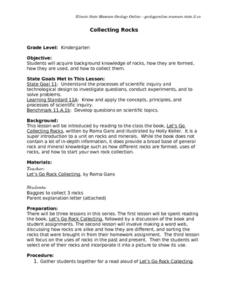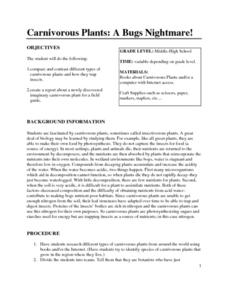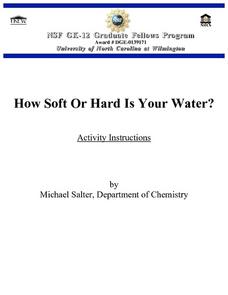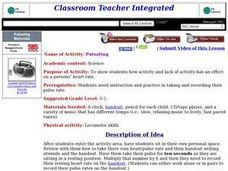Curated OER
Collecting Rocks
Students investigate how rocks are formed, how they are used, and how to collect them by listening to a read aloud of Roma Gans, Let's Go Collecting Rocks.. They discover background knowledge of rocks.
Curated OER
Don't Trust Your Eyes
Students brainstorm a list of possible actions that they could do to protect the water resources from pollution. They create hypotheses and conclusions by completing experiments and observing different pollutants.
Curated OER
What Are We?
Students describe different types of water pollutants. They complete experiments in which they observe the affects of water pollution on algae. They also brainstorm and list three causes of each water pollutant.
Curated OER
A Simple Viscosity Test
Fourth graders experiment with the viscosity of different liquids. They use a stopwatch to time the a steel ball as it drops through different liquids.
Curated OER
New Jersey Estuaries
Learners observe a stream table activity to realize how an estuary protects the mainland from floodwaters. They predict what will happen, then draw and write up the results.
Curated OER
Carnivorous Plants: A Bugs Nightmare!
Young scholars research carnivorous plants and how they trap insects. They role play as botanists to write a research field guide about a newly discovered imaginary carnivorous plant.
Curated OER
Zigzag Seeds
Pupils observe the effects of gravity on seeds. Students place seeds in various orientations and record their growth to determine how gravity affects the seeds' growth.
Curated OER
How Soft or Hard is Your Water?
Students test samples of water to determine how a chemical water softener affects water's ability to form suds. After collecting their data and analyzing their results, students answer follow-up questions about their lab.
Curated OER
What Is In The Cup?
Young scholars investigate the mixtures of solutions. They utilize cups filled with bases and acids. Students test and determine the pH of each cup. The multiple cups are compared to each other in order to chart acids and bases according...
Curated OER
Measurement
First graders listen to a read aloud of Linda Williams, The Little Old Lady Who Was Not Afraid of Anything" before discussing Halloween. They measure pumpkins using chains of paper clips to find their length and width. Once they open the...
Curated OER
Once In a Blue Moon
Young scholars review the characteristics of the planets and their moons. Using the internet, they research the relationship between the Earth and its moons. They take a template of the moon and draw craters of different colors to...
Curated OER
Focus: Word Processing
Sixth graders explore the basic units and prefixes of the metric system. They select a fairy tale or nursery rhyme to revise and rewrite with blanks where the metric system terminology can be inserted. Students, following given...
Curated OER
Poet-Tree (or shrub or forb)
Students write poetry to describe a noxious weed. They form a personal relationship with, and a better comprehension of weeds. Students explain what the basic elements of a haiku are. They describe a particular weed, and comprehend...
Curated OER
Water Pollution Lesson Plan: Don't Trust Your Eyes
Students develop a list of actions they could perform that would protect our water resources from pollution. They formulate hypotheses, conduct experiments and draw conclusions about actual pollutants found in our water supply.
Curated OER
Pond 1: Pond Life
Students work together to investigate familiar and unfamiliar ecosystems. Using the internet, they discover how different organisms use their environment to satisfy their needs. They also examine the relationshiops between organisms...
Curated OER
Cancer City USA
Learners investigate a phenomenon known as the cancer cluster. Students determine potential cancer clusters given real data and support their findings using mathematical calculations. Learners Create a graphical representation of the...
Curated OER
Energy Audits for the Elderly
Students perform experiments to determine the nature of energy particularly in air, light and water. They conducted an energy audit using the Energy Audit Checklist and by looking at the school's bills for gas and power.
Curated OER
A Lab Trilogy for Beginning Biology Teachers
Young scholars are able to explain their models to other students and to their parents. Then young scholars like to decorate the room by hanging the models or constructing mobiles of a number of models.
Curated OER
Change by Chance?
Sixth graders are able to see the role of chance in evolution. The activity is similar to the party game "gossip" or "telephone." Students start off with a drawing of an animal which changes as they pass their copies of the animal to...
Curated OER
Mayonnaise Jar Greenhouse
Third graders examine the Greenhouse Effect, how it operates and finally allows the student to experiment using a model created in the classroom. They explain how the greenhouse effect affects the Earth.
Curated OER
Dig Into the Dictionary
Second graders explore their vocabulary by participating in a dictionary word find activity. In this vocabulary lesson, 2nd graders locate words in a dictionary based on the beginning letter which must match the teacher's instructions....
Curated OER
Activity #17 Liquid Density and Temperature
Students comprehend that hot water rises up through cold water but cold water does not rixe in hot water. They comprehend that water at temperatures above 4oC decreases in density with increases in temperature. Students answer lab...
Curated OER
Is It Alive?
Eighth graders define the boundaries of living organisms. They determine what makes something a living organism and identify factors that constitute "living." Pupils write a conclusion about the evidence they found that yeast is alive...
Curated OER
Pulsating
Students explore how activity and lack of activity has an effect on a persons' heart rate. They receive instruction and practice in taking and recording their pulse rate. Students also incorporate a variety of music while taking their...
Other popular searches
- Second Grade Language Arts
- Second Grade Story Maps
- Second Grade Weather Unit
- Second Grade Money Lessons
- Plane Geometry Second Grade
- Second Grade Abc Order
- Decoding Skills Second Grade
- Second Grade Story Summary
- White House Second Grade
- Fitness Goals Second Grade
- Centimeter Second Grade
- Second Grade Proper Nouns

























